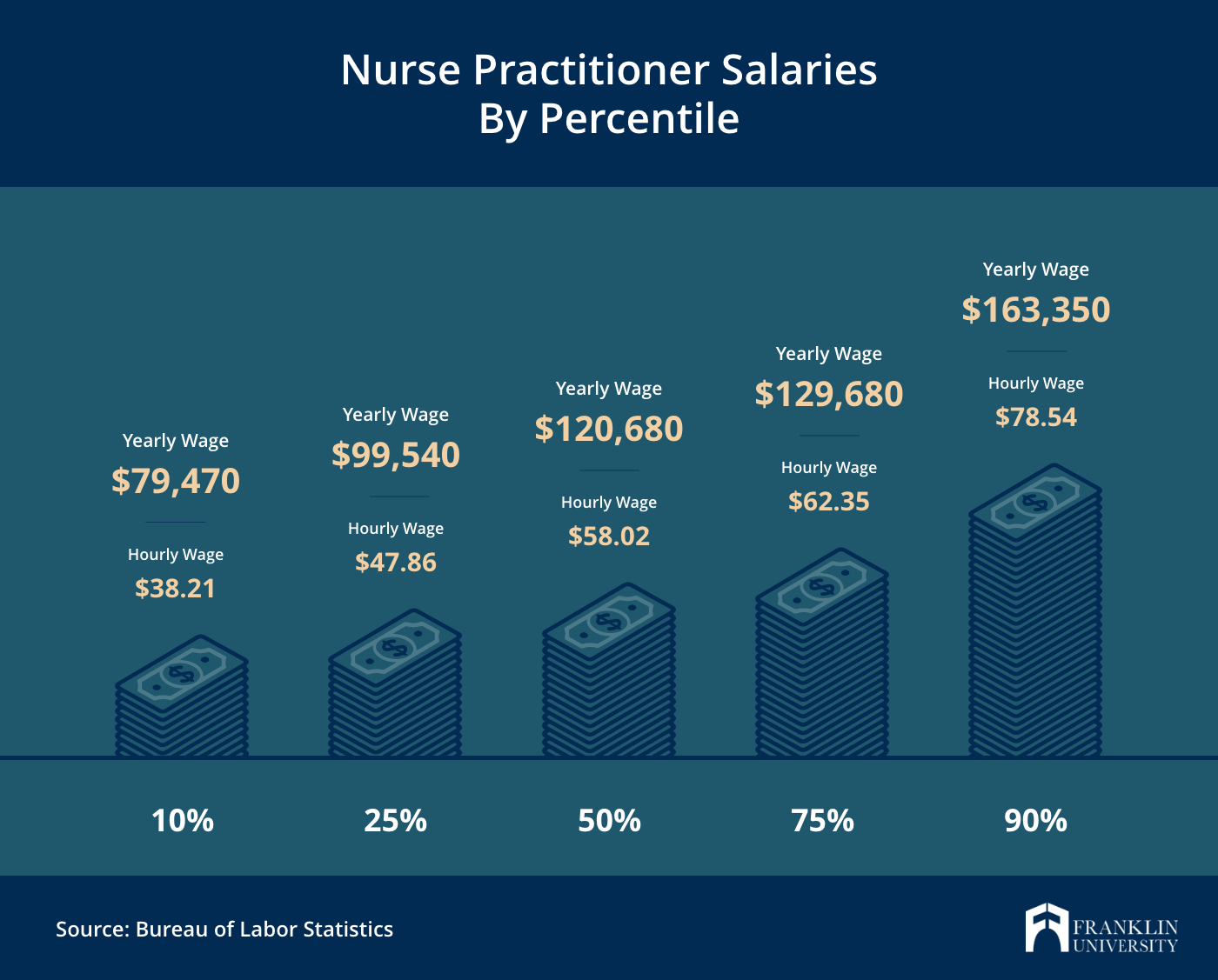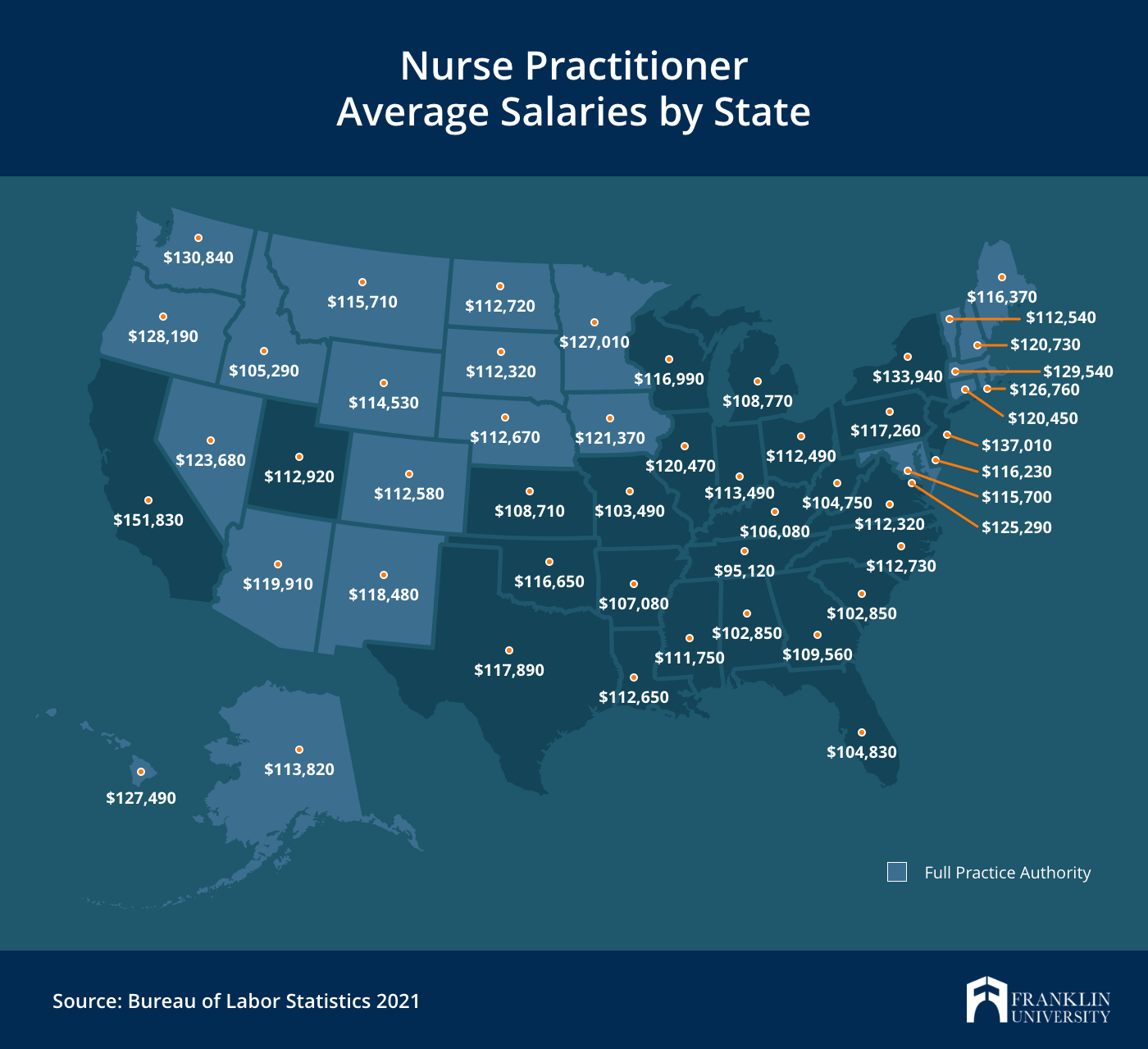Request Information
We're Sorry
There was an unexpected error with the form (your web browser was unable to retrieve some required data from our servers). This kind of error may occur if you have temporarily lost your internet connection. If you're able to verify that your internet connection is stable and the error persists, the Franklin University Help Desk is available to assist you at helpdesk@franklin.edu, 614.947.6682 (local), or 1.866.435.7006 (toll free).
Just a moment while we process your submission.

Family Nurse Practitioner Salary: How Much Can I Expect To Make?
Nurse practitioners (NPs) earn a median annual salary of $120,680 in the United States. Among NPs, 69.7% have a Family Nurse Practitioner (FNP) certification according to the American Association of Nurse Practitioners (AANP).
This makes FNPs the vast majority of certified nurse practitioners, with adult certification coming in a distant second at 10.8% of NPs. FNP is a popular certification based on the high demand for primary care providers, as well as its ability to connect a nurse’s passion for care with individuals across the age spectrum.
Nurse practitioner salaries as a whole are highly representative of nurse practitioners who serve as FNPs. Let’s look at the distribution of salaries for nurse practitioners—from the lowest to highest earners—across the United States.

However, salary expectations aren’t always this cut and dry. Several inputs help determine salary for FNPs, including location, employer, experience and other factors. This article can serve as a helpful benchmark to help you understand what to expect based on your individual circumstances.
Family Nurse Practitioner Salaries By Industry
One of the primary factors that influence FNP salary expectations is the industry in which you work. Let’s look at average salaries for nurse practitioners in four of the industries where FNPs most commonly provide care, plus the responsibilities of FNPs in each setting.
5 Top-Paying Industries for Family Nurse Practitioners | ||
| Industry | Average Annual Salary | Average Hourly Salary |
| Home Healthcare Services | $133,170 | $64.03 |
| Outpatient Care Centers | $129,190 | $62.11 |
| General Medical and Surgical Hospitals | $122,960 | $59.12 |
| Offices of Physicians | $114,870 | $55.23 |
The four most common industries for FNPs include:
- Home Healthcare Services: Home care FNPs focus primarily on preventive or palliative care. They commonly work with elderly patients, patients with disabilities or chronic illnesses and patients recovering from surgery. The best home care providers are FNPs that are both highly organized and nimble problem solvers, as treating complex medical issues inside someone’s home requires more flexibility than a standardized hospital environment.
- Outpatient Care Centers: Outpatient care relates to any healthcare procedure, treatment or other service that is conducted without an overnight stay in the hospital. FNPs who work in outpatient care centers may have a range of responsibilities, including conducting check-ups, treating illnesses, ordering lab tests and prescribing medication for children and adults. One of the most common types of outpatient care is urgent care, which relies heavily on FNPs to fill the gap when patients can’t be seen by a primary care physician or have an illness or injury that is beyond the primary scope of care.
- General Medical and Surgical Hospitals: FNPs work across many hospital departments, including emergency, critical and trauma care among others. FNPs who work with inpatient populations help provide high-quality, consistent care as well as interface with family members to relay treatment plans. Working in a hospital can be a valuable step in a career as an FNP as it helps individuals gain exposure to a wide variety of conditions and patient populations.
- Offices of Physicians: Acting as a primary care provider in a physician’s office is one of the most common career paths for FNPs. In some states, FNPs are able to practice independently, and may even own their own practice, while in other states they must be supervised by a doctor. FNPs choose primary care because they want to build strong relationships with patients and provide care for individuals and families over the course of their lives.
Get a FREE guide to help you advance your career, featuring helpful advice and thoughtful insights from nursing experts.
Where Do Family Nurse Practitioners Get Paid the Most? A State-by-State Comparison
Another major factor when considering salary is the state in which an FNP decides to practice. Large, populous states tend to have higher salaries. However, these states also often have higher costs of living, so keep that in mind when comparing salaries across states.
In some states, FNPs have full practice authority. This means that FNPs can prescribe, diagnose, and treat patients without physician oversight. This may also offer the opportunity for higher salaries. Nurse practitioners who operate in full-practice states can establish and operate their own independent practices, which can offer a path to entrepreneurship and higher earnings.

Think FNP Sounds Like a Well-Paying Career? Other Factors to Consider
A career as an FNP can be rewarding in many ways—salary included. However, there’s more to consider than median salary estimates. You need to look at the career more holistically to understand the long-term value of becoming an FNP, especially when determining where to work and how it impacts your overall standard of living.
Ask these questions when weighing career opportunities as an FNP.
- Does the expected salary cover all of your essential expenses, spending habits and savings goals based on your area's cost of living?
- Does the total compensation package add value beyond your gross annual salary that will make a meaningful impact on your short-term or long-term living standards?
- Do you understand the licensing restrictions in your state and will you be able to practice with the level of independence that you want?
- Do the workplace dynamics create an environment where you will thrive and enjoy going to work everyday—regardless of the pay?
- Will a career as an FNP help you meet long-term financial, professional and personal goals?
Find an FNP Program that Will Help You Make the Most of Your Investment
Becoming an FNP takes an investment of time, energy and money. To ensure you reap the benefits of this investment, look for a program that will help accelerate your education while providing the flexibility you need to maintain your career momentum.
Franklin University offers multiple paths to becoming an FNP. For RNs with a BSN, Franklin’s online MSN-FNP will provide the specialized knowledge and clinical skills you need to provide primary care to patients across the age spectrum. If you already earned your MSN degree, a post-graduate FNP Certificate or DNP-FNP can help you switch career paths and become an FNP.
Franklin’s programs are dedicated to maintaining the highest standards of nursing excellence and have a proven track record of graduates passing the national FNP certification exams. Discover which program is right for your next career move by comparing Franklin’s MSN-FNP, FNP Certificate and DNP-FNP programs.





